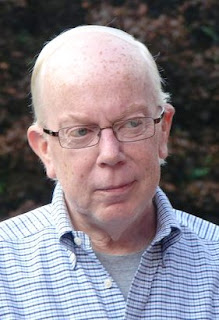Dave Creagh, an early All Things Considered executive producer who went on to lead other programs and major-market stations over his influential 22-year pubradio career, died Friday (Dec. 16) at home in Blowing Rock, N.C., following a short illness associated with treatment of a cancer diagnosis he received in November. He was 60.
Creagh was hired at NPR on Jan. 2, 1969 — even predating its first broadcast in April 1971. He served on NPR's Board of Directors. He directed ATC and became its executive producer during NPR's formative years, from 1971 to 1981. In the 1980s he managed CPB’s Satellite Program Development Fund, which provided seed money for programs to be distributed over the new Public Radio Satellite System.
Creagh produced jazz programming with pianist Billy Taylor as host and managed KLON-FM, the Los Angeles-area jazz station in Long Beach now known as KKJZ. He built and managed Baltimore’s WJHU-FM, then licensed to Johns Hopkins University; started and directed the radio doc anthology Soundprint while at WJHU and became e.p. of Monitor Radio, the daily news service of the Christian Science Monitor, an early alternative to NPR news programming.
“In the days when we often began ATC unsure of exactly how it would end 90 minutes later, Dave’s was the steady hand on the tiller,” recalled Rick Lewis, who was a newscaster in NPR’s early days and then succeeded Creagh in other jobs. “There might have been pandemonium behind the scenes, but the precision of NPR’s sound was already emerging."
"I always thought of Dave as modern day Tom Sawyer," said Ernest Sanchez, a longtime public broadcasting attorney and a friend of Creagh's for more than 35 years. "When there was serious work to be done, Dave was capable of recruiting anyone to help with the work, and convincing them they would have fun. And Dave always delivered on the fun, along with serious, imaginative results."
"He appreciated the art of radio," independent pubradio producer Jay Allison told Current. "He was open to the new, and he encouraged talented young producers and their unlikely ideas. Not every skilled manager is willing to take that risk. We all still benefit from the people and ideas Dave ushered into public radio."
As executive producer for Monitor Radio in the 1990s, Creagh hired Sue Schardt, now executive director of Association of Independents in Radio. The NPR competitor, operated as a public service by the Church of Christ, Scientist, "did a lot of groundbreaking work," Schardt said: The first to produce a 4 p.m. news magazine for public radio. The first to produce a midday report at noon, 5 a.m. newscast, and a 24/7 newscast. "We were the upstart, the underdog," she said. "And Dave was the one always pushing the envelope, looking at ways to carve a path forward, to get resources to do more and better."
In the mid-1990’s, Creagh also helped launch and later served as senior vice president at the nonprofit Alliance for Public Broadcasting, a pioneer in transaction-based fundraising for the system. “We’ve lost a valuable man, a formidable professional, a fine mind, great heart and a honed wit," said Creagh's close friend and colleague Walt McRee, founder and president of the alliance, which was active until 2008. "Dave had a journalist’s mind and a broadcaster’s heart and was dedicated to straight talk and loyalty to friends and family.”
He was born Sept. 25, 1951, in Washington, D.C., the son of Nelda and Edward Creagh, a well-known correspondent with The Associated Press during the 1940s and '50s. He graduated from Walt Whitman High School in Bethesda, Md., in 1969, and the University of Maryland in 1972.
During his time at NPR, his marriage to fellow staffer Katherine Roe "was one of NPR's first matrimonial unions," the family said in a statement. He is survived by two children, Mary Dolores Creagh and Charles Randall Creagh of Boston; one sister, Elizabeth (Creagh) Martin of Virginia; and a number of nieces and nephews.
Current is working on a full obituary.


4 comments:
I worked with Dave in developing Monitoradio. He was a brilliant producer and a fine gentleman. He will be missed. John Dozier
My favorite comment from Dave came when he paid a one week visit to WGBH in the early 80's to help us revamp our daily local magazine. Commenting on the oh-so-serious nature of our "GBH Journal" program he said after listening to one show, "What is this - the hour of pain?" Like many, I also worked with Dave during the development (and closure) of Monitor radio. Dave loved re-tooling and re-inventing things and Monitor was one of those places where he was really able to do just that. The Monitor was a better place for his efforts.
Greg Fitzgerald
I remember Dave fondly. When he took over KLON in 1981, I called him out of the blue to pitch an R&B show and since he had enjoyed such a show on WPFW, told me to come in a do a demo tape. It was awful. He played it at home on Sunday morning to hear how I'd sound. He took a chance and I hosted the successful show to 1990. He loved to host parties and foster a sense of community. Things were never the same after Dave left.
I had the pleasure of working with Dave for 10 years. As so many others have said, he was a creative, innovative soul, and he reveled in giving people a chance to spread their wings. R.I.P.
Post a Comment